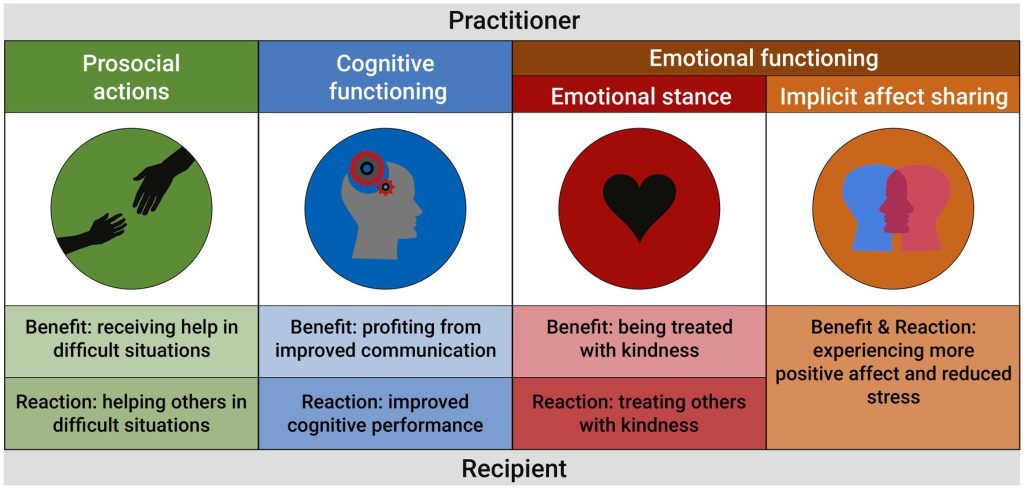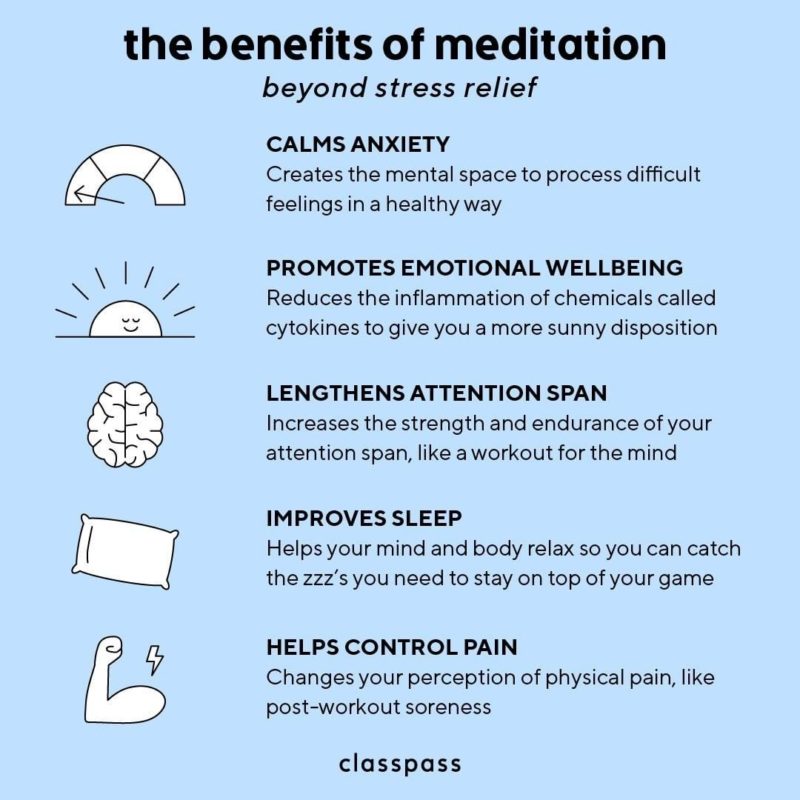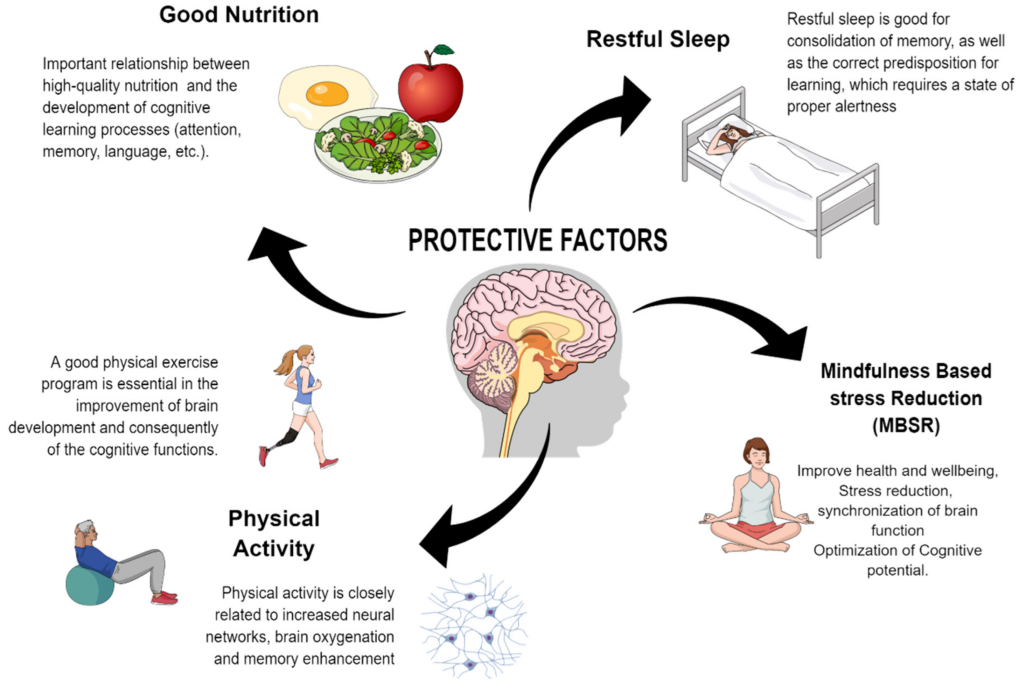In this article, you will discover the many benefits of meditation beyond stress relief. We will explore how meditation can enhance cognitive function and overall well-being. If you've ever been curious about meditation and wanted to learn more about its positive effects on the mind and body, this is the perfect read for you. So sit back, relax, and prepare to gain a deeper understanding of the power of meditation.
The Science Behind Meditation
Meditation has gained widespread popularity in recent years and for good reason. Beyond its reputation as a stress-relieving practice, meditation has proven to have numerous positive effects on the brain and overall well-being. Through extensive research, scientists have uncovered the fascinating science behind meditation and its impact on various aspects of our lives. Let's explore the profound effects of meditation on the brain, its role in stress reduction, improving cognitive function, managing emotions and mental health, enhancing physical health, improving sleep quality, developing mindfulness and self-awareness, and unlocking personal growth potential.
The Effects of Meditation on the Brain
Numerous studies have shown that regular meditation brings about measurable changes in the brain. One of the key findings is the significant increase in neuroplasticity - the brain's ability to reorganize and form new connections. This phenomenon allows for improved cognitive function, emotional regulation, and mental well-being. Additionally, meditation has been found to increase the thickness of the prefrontal cortex, the area responsible for executive functions such as decision-making and attention. These structural changes in the brain contribute to the positive effects of meditation on our overall mental health.
Neuroplasticity and Meditation
Neuroplasticity is the brain's remarkable ability to reorganize and adapt throughout our lives. Through meditation, we can harness this innate potential and actively shape our brain's structure and connectivity. Studies have shown that practicing mindfulness meditation leads to an increase in gray matter density in areas associated with attention, compassion, and emotional regulation. This strengthening of neural connections enhances cognitive abilities, empathy, and overall mental well-being. By engaging in regular meditation, you can actively cultivate a more resilient and adaptable brain.
The Role of Meditation in Stress Reduction
In our fast-paced modern lives, stress has become one of the defining challenges we face. Fortunately, meditation offers a natural and effective way to combat stress and promote relaxation. Regular meditation practice has been found to lower the production of stress hormones such as cortisol while increasing the release of feel-good chemicals like serotonin and endorphins. This hormonal balance induces a state of deep relaxation and tranquility, allowing you to navigate life's challenges with greater ease. By incorporating meditation into your daily routine, you can significantly reduce stress levels and increase your overall sense of well-being.
Improving Cognitive Function through Meditation
Beyond its calming effects, meditation can have a profound impact on cognitive function. The practice of meditation has been shown to enhance focus and attention, improve memory and learning abilities, and even boost creativity.
Enhanced Focus and Attention
In a world filled with distractions, developing enhanced focus and attention is a valuable skill. Regular meditation has been found to strengthen the brain's attention networks, resulting in improved concentration and the ability to sustain focus for longer periods. By redirecting your attention back to the present moment through meditation, you can train your brain to ignore distractions, leading to increased productivity and a sharper mind.
Improved Memory and Learning
Memory and learning are integral aspects of our cognitive abilities. Research has found that meditation positively affects these functions, specifically in the hippocampus - the area of the brain responsible for memory consolidation. By stimulating the growth of new neurons and increasing blood flow to this region, meditation enhances our ability to retain information and learn new skills. Incorporating meditation into your daily routine can have a profound impact on your cognitive abilities, leading to improved memory recall and accelerated learning.
Increased Creativity
Creativity is not solely reserved for artists and musicians; it is an essential skill in problem-solving and innovation. Meditation has been shown to enhance creativity by facilitating divergent thinking and encouraging the generation of new ideas. By quieting the mind and allowing thoughts to flow freely, meditation helps break through mental barriers and fosters a more expansive and flexible mindset. Embracing regular meditation can unlock your creative potential and allow for innovative solutions to emerge in various areas of your life.

Managing Emotions and Mental Health
In addition to cognitive benefits, the practice of meditation has powerful effects on our emotional well-being and mental health. By reducing anxiety and depression, boosting emotional intelligence, and promoting overall mental well-being, meditation provides a multifaceted approach to managing and improving our emotional state.
Reducing Anxiety and Depression
Anxiety and depression are prevalent mental health conditions that affect millions of people worldwide. Meditation has been proven to be an effective tool in alleviating the symptoms associated with these conditions. By promoting a sense of calm and inner peace, meditation helps reduce anxiety levels and depression by regulating the body's stress response. The practice teaches individuals to detach from negative thoughts and emotions, allowing for a more balanced perspective and a greater sense of emotional well-being.
Boosting Emotional Intelligence
Emotional intelligence refers to the ability to recognize and manage our emotions effectively. Meditation plays a crucial role in developing emotional intelligence by cultivating self-awareness and empathy. Through mindfulness and self-reflection, meditation helps individuals develop a deeper understanding of their emotions, enabling them to respond rather than react to challenging situations. By enhancing emotional intelligence, meditation empowers individuals to build healthier relationships, make better decisions, and experience greater overall happiness.
Promoting Overall Mental Well-being
Maintaining good mental health is essential for a fulfilling and satisfying life. Regular meditation has been shown to promote mental well-being by reducing stress levels, improving sleep quality, and instilling a greater sense of purpose and contentment. By integrating meditation into your daily routine, you can create a solid foundation for your mental health, fostering resilience and emotional stability in the face of life's ups and downs.
Enhancing Physical Health
While meditation is primarily known for its mental and emotional benefits, there is also a growing body of research showing its positive impact on physical health. From reducing blood pressure and cardiovascular risks to boosting the immune system and alleviating chronic pain, meditation offers a holistic approach to overall well-being.
Reducing Blood Pressure and Cardiovascular Risk
High blood pressure and cardiovascular diseases are major health concerns worldwide. Studies have shown that regular meditation can significantly lower blood pressure, reducing the risk of heart disease and stroke. By inducing a relaxation response in the body, meditation helps dilate blood vessels, improves blood flow, and decreases the production of stress hormones that can contribute to hypertension. Incorporating meditation into your daily routine can be a proactive step towards maintaining a healthy cardiovascular system and preventing heart-related issues.
Boosting the Immune System
A strong immune system is vital for our overall health and well-being. Meditation has been found to strengthen the immune system by reducing inflammation and improving immune response. By lowering stress levels and promoting relaxation, meditation enhances the activity of natural killer cells, which play a critical role in fighting off viruses and infections. Regular meditation practice can, therefore, help fortify your body's defense mechanisms and support optimal immune system function.
Alleviating Chronic Pain
Chronic pain can have a debilitating impact on one's quality of life. Meditation has emerged as a non-pharmacological approach to pain management, offering relief for individuals suffering from various forms of chronic pain. By activating brain regions associated with pain modulation, meditation can reduce the perception of pain and improve one's ability to cope with physical discomfort. By incorporating meditation techniques specifically designed for pain management, individuals can experience a greater sense of control and resilience in the face of chronic pain.

Improving Sleep Quality through Meditation
Sleep is a fundamental pillar of our well-being, with far-reaching effects on our physical, mental, and emotional health. Unfortunately, many individuals struggle with sleep-related issues such as insomnia. Meditation offers a natural and effective solution to improve sleep quality and overcome insomnia.
Fighting Insomnia
Insomnia, characterized by difficulty falling asleep or staying asleep, can significantly impact our daily functioning. Meditation has been shown to be a valuable tool in combating insomnia by promoting relaxation and regulating sleep patterns. By engaging in a bedtime meditation practice, individuals can quiet their minds, release tension, and create the optimal mental state for restful sleep. Through focused attention on the present moment, meditation can help break the cycle of racing thoughts and promote a deeper and more rejuvenating sleep.
Creating a Relaxing Bedtime Routine
Establishing a relaxing bedtime routine is essential for a restful night's sleep. Meditation provides a valuable component to this routine by preparing both the mind and body for sleep. By incorporating meditation techniques such as deep breathing, body scans, and guided visualization, individuals can create a soothing environment that encourages relaxation and sets the stage for a peaceful transition into sleep. Regular practice of a bedtime meditation routine can establish healthy sleep habits and contribute to improved sleep quality over time.
Increasing Deep Sleep
Deep sleep, also known as slow-wave sleep or NREM (non-rapid eye movement) sleep, is a crucial stage of the sleep cycle. It is during this phase that the body repairs and regenerates tissues strengthens the immune system, and consolidates memories. Meditation has been found to increase the duration and quality of deep sleep, leading to enhanced physical and cognitive restoration. By practicing meditation before bedtime, you can optimize your sleep architecture and wake up feeling refreshed and rejuvenated.
Developing Mindfulness and Self-Awareness
Mindfulness and self-awareness are foundational skills that support personal growth, emotional resilience, and healthier relationships. Meditation serves as a powerful tool for cultivating present-moment awareness, enhancing self-reflection and insight, and fostering compassion and empathy.
Cultivating Present-Moment Awareness
In today's fast-paced world, our minds are often preoccupied with thoughts about the past or worries about the future. Meditation offers an antidote to this constant mental chatter by cultivating present-moment awareness. By training the mind to focus on the here and now, meditation helps individuals develop a greater sense of clarity, engagement, and appreciation for each moment. By regularly practicing present-moment awareness, you can experience a deeper connection with yourself and the world around you.
Enhancing Self-Reflection and Insight
Self-reflection is essential for personal growth and self-improvement. Meditation provides a platform for introspection and self-discovery, allowing individuals to gain a deeper understanding of their thoughts, emotions, and patterns of behavior. By cultivating a non-judgmental attitude towards oneself, meditation enables individuals to develop self-awareness, recognize their strengths and weaknesses, and make conscious choices that align with their values. Through regular meditation practice, you can embark on a journey of self-discovery and continual growth.
Fostering Compassion and Empathy
Compassion and empathy are vital qualities that contribute to the well-being of both oneself and others. Research has shown that meditation enhances empathic responding and promotes prosocial behavior. By practicing loving-kindness meditation, individuals can develop feelings of compassion towards themselves and others, ultimately leading to enhanced emotional well-being and more harmonious relationships. By consciously cultivating compassion and empathy through meditation, you can foster a mindset that embraces kindness and connection with the world around you.

Unlocking the Potential for Personal Growth
Meditation offers a path to personal growth and self-actualization, empowering individuals to unlock their full potential. By increasing self-confidence and resilience, supporting goal setting and achievement, and deepening self-understanding and purpose, meditation becomes a catalyst for personal transformation.
Increasing Self-Confidence and Resilience
Self-confidence and resilience are crucial qualities that empower individuals to overcome challenges and pursue their dreams. Meditation has been shown to boost self-confidence by increasing self-awareness, acceptance, and a sense of inner calm. By incorporating meditation into your daily routine, you can develop a greater belief in your abilities and cultivate the resilience necessary to bounce back from setbacks. The practice of meditation provides a solid foundation for building a strong sense of self and facing life's obstacles with courage and determination.
Supporting Goal Setting and Achievement
Setting and achieving goals is an integral part of personal growth and success. Meditation can contribute to this process by enhancing focus, clarity, and motivation. By practicing meditation techniques such as visualization and affirmation, individuals can align their subconscious mind with their goals, fostering a positive mindset and unlocking their inner potential. Regular meditation practice can bring about a sense of purpose and direction, making goal-setting more meaningful and attainable.
Deepening Self-Understanding and Purpose
Many individuals seek a deeper understanding of themselves and their purpose in life. Meditation offers a path toward self-discovery, enabling individuals to explore their core values, beliefs, and passions. By carving out time for introspection and self-reflection, meditation helps individuals gain clarity on their life's purpose, leading to more intentional decision-making and a greater sense of fulfillment. Incorporating meditation into your personal growth journey can open up new avenues of self-understanding and allow for a more purposeful and meaningful life.
Meditation Techniques for Beginners
Embarking on a meditation practice can feel overwhelming for beginners. Fortunately, there are various techniques that cater to different preferences and goals. Here are three popular meditation techniques to get you started:
Breath Awareness Meditation
Breath awareness meditation involves focusing all your attention on your breath. Find a quiet space, sit comfortably, and close your eyes. Pay attention to the sensation of your breath as it enters and leaves your body. If your mind wanders, gently guide your attention back to the breath. Practice this technique for a few minutes each day and gradually increase the duration as you become more comfortable.
Mantra Meditation
Mantra meditation involves the repetition of a word, phrase, or sound to focus the mind and induce a state of deep relaxation. Choose a mantra that resonates with you, such as "peace" or "love." Sit in a comfortable position, close your eyes, and silently repeat the mantra with each breath. Allow the mantra to become a focal point, bringing your attention back whenever your mind wanders.
Loving-Kindness Meditation
Loving-kindness meditation involves cultivating feelings of love, compassion, and kindness towards oneself and others. Sit in a comfortable position, close your eyes, and bring to mind someone you care about deeply. Silently repeat phrases such as "May you be happy, may you be healthy, may you live with ease." Gradually extend these wishes to yourself, loved ones, acquaintances, and even difficult individuals. Allow the feelings of love and compassion to fill your heart and radiate outwards.
Incorporating Meditation into Daily Life
While setting aside dedicated time for meditation is essential, it is equally valuable to integrate mindful awareness into everyday activities. Here are some tips for incorporating meditation into your daily life:
Finding Time for Meditation
Set aside a specific time each day for your meditation practice. Whether it's in the morning before you start your day or in the evening before bed, consistency is key. Start with a few minutes and gradually increase the duration as you become more comfortable. Remember, even short moments of meditation throughout the day can have a profound impact on your overall well-being.
Creating a Sacred Space
Designate a quiet and peaceful space in your home where you can meditate without distractions. Transform this space into a sanctuary by surrounding yourself with elements that evoke a sense of tranquility, such as candles, cushions, or plants. This sacred space will serve as a visual reminder to prioritize self-care and cultivate inner calm.
Integrating Meditation with Other Activities
Mindful awareness can be extended to various daily activities, turning them into meditation practices in themselves. For example, practice mindful eating by savoring each bite and fully engaging your senses. Incorporate walking meditation by paying close attention to the sensation of each step and the environment around you. By infusing mindfulness into everyday tasks, you can transform them into opportunities for grounding yourself in the present moment.
Overcoming Challenges and Maintaining a Consistent Practice
Maintaining a consistent meditation practice can be challenging, especially when faced with restlessness or a lack of motivation. Here are some strategies for overcoming common challenges and staying committed to your practice:
Dealing with Restlessness and Racing Thoughts
Restlessness and racing thoughts are common obstacles encountered during meditation. Instead of resisting these thoughts, acknowledge their presence and gently guide your attention back to your chosen object of focus, whether it's the breath, a mantra, or a visualization. Remember, meditation is a practice of observation without judgment. With time and patience, you will develop the skill to anchor your attention and find stillness amidst the mental chatter.
Staying Motivated and Committed
Motivation can fluctuate when starting a new habit, but staying committed to your meditation practice is essential for reaping its benefits fully. Set realistic goals and acknowledge the progress you make, no matter how small. Find inspiration from others who have experienced the transformative power of meditation and seek support from meditation communities or online resources. Creating a positive and supportive environment will foster motivation and help you stay on track.
Finding Support and Guidance
Seeking support and guidance can significantly enhance your meditation practice. Join meditation groups or attend retreats where you can learn from experienced practitioners and share your experiences with like-minded individuals. Consider working with a meditation teacher to deepen your understanding and receive personalized guidance. Connecting with others on a similar journey can provide valuable insights and motivation to maintain a consistent meditation practice.
In conclusion, the science behind meditation reveals its remarkable benefits for the brain, cognitive function, stress reduction, emotion regulation, physical health, sleep quality, mindfulness, and personal growth. By embracing various meditation techniques and incorporating them into your daily life, you can tap into the transformative power of meditation and experience profound improvements in your overall well-being. Start your meditation journey today and unlock the boundless potential for growth, happiness, and contentment.
© 2016-2023 by newsbucket.org, a LIVenture LLC.
All rights reserved. No part of this document may be reproduced or transmitted in any form or by any means,
electronic, mechanical, photocopying, recording, or otherwise, without prior written permission of LIVentures LLC.




0 Comments